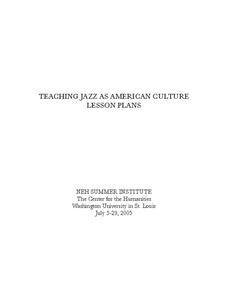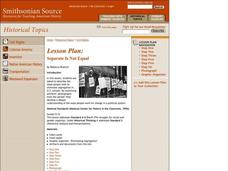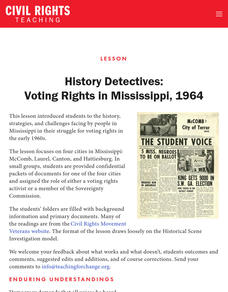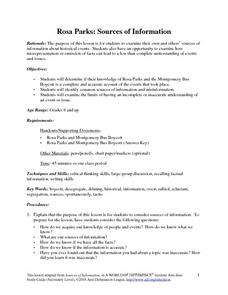Washington University in St. Louis
Teaching Jazz as American Culture
Jazz and the City, Jazz and the Civil Rights Movement, Jazz and Gender, Jazz and Literature, Jazz and the Arts, Jazz and Film. Here's a packet of unit plans organized around themes that reflect American culture. Each unit examines how...
Miama-Dade County Public Schools
African Americans and the Civil War
The American Civil War is the theme of this packet of materials prepared for Black History Month. Class members learn about the roles that African Americans played during the Civil War and examine the African-American experience after...
EngageNY
Developing an Opinion Based on the Textual Evidence: Jackie Robinson’s Role in the Civil Rights Movement (Promises to Keep, Pages 50–57)
Caption this. Scholars look at pages 50-57 of Promises to Keep and discuss the photographs on the pages. They analyze the captions with the pictures and then discuss vocabulary such as human rights and civil rights.
National Endowment for the Humanities
"Sí, se puede!": Chávez, Huerta, and the UFW
"Sí, se puede!" Cesar Chavez and Dolores Huerta believed organizing farm workers and changing their working conditions were possible. Scholars examine provisions of the Bracero Program, videos, and the United Farm Workers' (UFW) work....
Defining US
Integration of Education and American Society
How did the struggle for Civil Rights during the 1950s transform American society and politics? Why are American schools integrated today? Class members explore these essential questions by examining a series of primary and secondary...
Center for Civic Education
The Power of Nonviolence: Rosa Parks: A Quest for Equal Protection Under the Law
Teach young historians about the historical legacy of Rosa Parks with a multi-faceted lesson plan. Pupils follow stations and use journals to explore prominent events, analyze primary resource documents, and engage in interesting...
Stanford University
Lesson Plan: Montgomery Bus Boycott
Most of us have heard of Rosa Parks, the Montgomery Bus Boycott, and Martin Luther King, Jr. But what about Claudette Colvin, Virginia Durr, Freedom Summer, or the Birmingham Children's Crusade? A five-lesson unit prompts class members...
Annenberg Foundation
Egalitarian America
What does a true American represent? Scholars investigate the equal rights era of the 1960s and 1970s in the 20th installment of a 22-part series on American history. Using photographic, magazine, written, and video evidence, groups...
Library of Congress
Women's Suffrage Movement Across America
An engaging resource provides many primary source materials to inform a study of the Women's Suffrage Movement. Suggestions include building a timeline of the fight, using the documents as the basis of a DBQ, and/or using a Venn diagram...
Albert Shanker Institute
Who Was Bayard Rustin?
Who was Bayard Rustin? Pupils analyze a series of primary source documents to learn about this important figure in the civil rights movement. The lesson contains a short film to watch along with guiding questions and other resources...
Curated OER
Separate Is Not Equal
Based on discussion, analysis of primary source documents, and with the help of a graphic organizer, young historians discover the steps that were taken to eliminate segregation in public schools in the United States. This instructional...
Stanford University
Martin Luther King, Jr. and Malcolm X: A Common Solution?
Much has been made of the differences between Martin Luther King, Jr. and Malcolm X. But was there any common ground between them? Class members reconsider what they think they know about these two civil rights leaders with biographical...
Curated OER
Unit 1: Building Historical Background Knowledge: The Road to Revolution 1754–1776
What were the conditions that led to the American Revolution? What are the conditions that lead to revolution in other times and places? Class members examine primary source materials and use evidence drawn from these documents to craft...
Curated OER
Unit 2: Post-Revolution: The Critical Period 1781-1878
The post-Revolutionary Period of 1781-1787, also known as the Critical Period, is the focus of a series of lessons that prompt class members to examine primary source documents that reveal the instability of the period of the Articles of...
Urbana School District
Knocking Down Fences
After reading The Other Side and guiding children through a picture walk, third graders investigate evidence of the civil rights movement. In the mini unit, 3rd graders analyze photographs of the past and make connections between...
K20 LEARN
The Bank Of Justice: Civil Rights In The US
To launch a study of racial segregation and integration, young historians first watch a news video about a prom in Georgia that was first integrated in 2013. They then compare the goals in Lincoln's Gettysburg Address to King's "I Have a...
Core Knowledge Foundation
Early Presidents and Social Reformers
A unit by Core Knowledge begins with information about early United States presidents. Pupils then explore social reformers such as Sojourner Truth and Frederick Douglas, abolitionism, women's rights, and more. Participants listen and...
National Woman's History Museum
Dolores Huerta: The Life and Work of a 20th Century Activist
Extra! Extra! High schoolers read about Dolores Huerta, the social activist who helped organize the United Farm Workers. Researchers read primary and secondary sources about Huerta's work and craft a headline, supported by three pieces...
Museum of Tolerance
Making Lemonade: Responding to Oppression in Empowering Ways
An activity focused on tolerance encourages class members to consider how they might respond when they or someone else is the target of oppression and discrimination. After researching how some key figures responded to the anti-Semitism...
PBS
The Meaning of the Fourteenth Amendment
The Fourteenth Amendment was extremely important to civil rights and is a crucial one to remember. The resource teaches about the Supreme Court decisions related to the amendment through writing exercises, reading, and working in small...
Teaching for Change
History Detectives: Voting Rights in Mississippi, 1964
Promises made and promise broken. Spies and activists. Voting rights in Mississippi are the focus of a lesson that has class members research the history of the struggle in Mississippi. Learners take on the role of voting rights...
EngageNY
Writing a Second Body Paragraph and Conclusion for an Opinion Essay: Jackie Robinson’s Role in the Civil Rights Movement (Promises to Keep, Pages 50–57)
Class members begin to work on the body paragraphs of their opinion essays about Jackie Robinson started in the previous instructional activity. They analyze a model paragraph and underline reasons for the opinion. Learners then take...
Anti-Defamation League
Shirley Chisholm: Unbought, Unbossed and Unforgotten
A 13-page packet introduces high schoolers to a lady of amazing firsts. Shirley Chisholm was the first Black woman elected to Congress, the first Black woman to run for President of the United States, and a leader of the Women's Rights...
Anti-Defamation League
Rosa Parks: Sources of Information
Young scholars show what they know about Rosa Parks and the incident on one of the buses in Montgomery, Alabama. Groups discuss and identify where they receive most of their information. They examine the importance of having a complete...

























